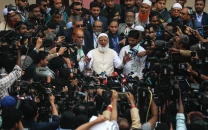Pakistani voters torn between beliefs and bills
Pakistani voters torn between beliefs and bills
1730891630-0/BeFunk_§_]-(42)1730891630-0-640x480.webp)
Donald Trump has emerged as the President-elect of the United States, securing a majority of the electoral votes last night – a decisive victory caught many by surprise, defying the expectation of a closer race.
As Americans gathered around their TVs on election night, the results painted a clear picture early on. Democrats were left hoping for a miracle that never came as Trump widened the gap, and what was supposed to be a nail-biter turned into a walk in the park.
In 2016, Trump stunned political experts with his unexpected victory over Hillary Clinton. His win was a shock that broke all American norms. Though his opponents attempted to counter him in 2020, this time, they seemed helpless. While many expected Trump to win, Democrats clung to the hope that a change of candidate could bring an upset.
However, the party's decision to change candidates looked like grasping at straws, as Trump's victory loomed large. He appears to have decoded the strategy for American political success.
Trump first outperformed his Republican challengers and then went head-to-head with Democratic nominee Kamala Harris, who struggled to make an impact against him on election night.
Faiz Rehman, a senior Pakistani journalist based in Washington D.C., shared his perspective, asserting that "it was never a close race for Donald Trump."
"The media projected it as a close race. Kamala wasn't a real candidate and she was imposed last minute as a democrat candidate. She didn't go through the process of becoming a proper democratic nominee. It was never a close race. We were only told that it was a close race."
Many felt that Trump outperformed, while Harris fell short. Despite hopes that Harris's candidacy would galvanize women voters, especially following the Roe v. Wade decision, her campaign failed to capture this support.
Her historic bid as the first potential female president did not resonate as expected. Democrats had also counted on a surge of support from communities of colour, imagining a rallying force under Harris's leadership. However, the anticipated support from women, people of colour, and young voters failed to materialise.
The voting base Harris needed showed a lukewarm response, and her confused message left many voters unimpressed.
Democrats had hoped Kamala Harris, with her impressive credentials and compelling backstory, would be the textbook change agent American voters were yearning for. However, even with the glitter of celebrity endorsements, she couldn't make the magic happen.
As exit polls revealed, young voters and even first-time participants were lukewarm, barely lifting a finger for Harris. She had the chance to take an emphatic lead among them, providing a counterbalance to Trump's fervent base, but instead, her candidacy seemed too closely tethered to Biden's presidency.
People saw her as an extension of the last four years of Democratic rule, rather than the fresh breeze of change they desired.
Even the Muslim vote, which Democrats had courted, was not swayed. Despite Harris's efforts to appeal to this demographic, many Muslim voters, especially in swing states like Michigan, were disappointed.
Michigan, with around 200,000 Muslim voters, appears to lean Trump's way.
Frustrations over the Biden administration's response to Israel's war on Gaza pushed some voters toward Green Party candidate Jill Stein, who attracted attention among Arab-American voters.
Fahmida Soomro, of Pakistani descent and living in New Jersey, voted for Stein and said that, as a Muslim voter, she felt compelled to vote for the third (Green) party, although it's disappointing to know it may not make much of a difference.
"Although we identify as Democrats otherwise, when it comes to every other issue, the reason for not voting blue is the American foreign policy on Palestine and Israel. It's a question of being on the right side of humanity, and the irony is that both these parties don't understand that their stance goes against true American values."
Trump certainly outperformed in these elections. His campaign mostly emphasized the state of democracy, the economy, and immigration. For many Pakistani Muslim voters, this election was all about the economy.
Inflation has made things difficult for them, and there is a general sentiment that their grocery bills are spiralling out of control. Trump is seen here as someone who can fix things up.
Muddassir Khan, a Pakistani-American in Virginia, says that "grocery expense has become the biggest fight here for an ordinary American. They have almost doubled recently. Living has become very expensive recently and difficult during last few years".
Trump's support in rural areas also played a crucial role, showing strong numbers even in traditionally Democratic states. For example, in Virginia's Shenandoah County, Trump won 70% of the vote despite the state's overall Democratic lean.
Rural America visibly backed Trump, with Trump-Vance signs dotting front yards throughout the countryside. His support here allowed him to surpass Harris in both the popular and electoral votes.
In the Pakistani community in the United States, clustered mainly around major cities, there was no unified stance. Many Pakistani Americans wrestled with conflicting priorities.
Ahmed Siddique, a young Muslim-American voter in New Jersey, described his dilemma: "As a Muslim American, I feel conflicted and let down by the choices, but I am still thankful that I have a say and remain hopeful about the future. For me, hope is the most integral part of the American dream," he shared.
Immigration was also a focus of Donald Trump's campaign, and despite apprehensions, he managed to rally some Pakistani voters behind him. According to Faiz Rehman, a senior journalist based in Washington, D.C., multiple factors encouraged Pakistanis to vote for Trump despite his stance on immigration.
"A major concern for Pakistani voters was Pakistan's internal domestic situation and how Trump's victory could impact it. A lot of Pakistani voters think that Trump will do something about Imran Khan's release."
Donald Trump controlled the political narrative in these elections. This election was about him. The results continuously show that U.S. politics isn't following a textbook approach anymore.
There is a new code to unlock political success here, and Donald Trump knows it well. The rules of the game have changed, and these rules are set by Donald Trump.



















COMMENTS
Comments are moderated and generally will be posted if they are on-topic and not abusive.
For more information, please see our Comments FAQ